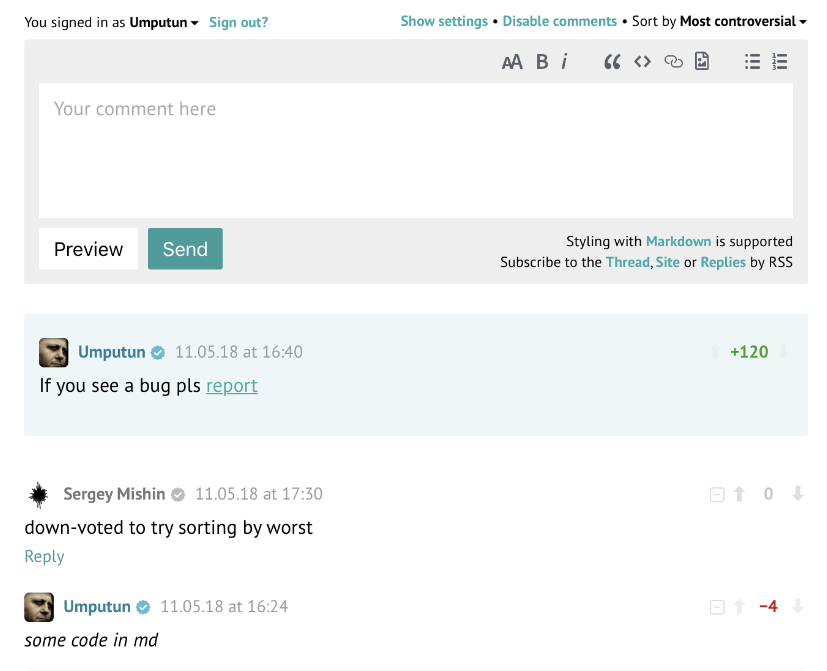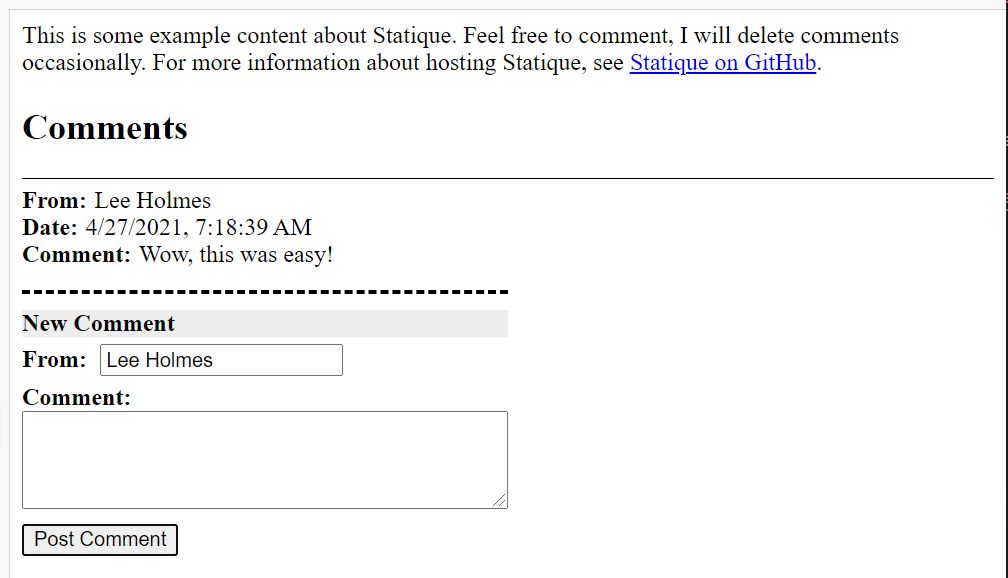10 Open-Source Self-hosted Commenting Apps to Add Interactivity to Your Static Website
Table of Content
A self-hosted commenting system is a commenting solution that is hosted on your own server or infrastructure, rather than relying on a third-party service. This gives you more control over your data and allows you to customize the commenting experience to suit your specific needs.
Static websites can benefit from self-hosted commenting systems because they enable increased activity and user engagement. Here are some reasons why static websites need self-hosted commenting systems:
- Increased Activity: By adding a commenting system to your static website, you provide a platform for visitors to leave comments, ask questions, and engage in discussions. This can lead to increased activity on your website as visitors interact with your content and each other.
- User Engagement: Comments allow visitors to interact with your content and provide feedback. This engagement can help build a sense of community and encourage visitors to spend more time on your website. It also provides an opportunity for you to respond to comments and engage directly with your audience.
- Better SEO: User-generated content, such as comments, can contribute to improved search engine optimization (SEO) for your static website. Search engines often prioritize websites with fresh and relevant content, and comments can help provide that additional content.
- Visitor Insights: Comments can provide valuable insights into your visitors' opinions, questions, and preferences. By monitoring and analyzing the comments on your static website, you can gain a deeper understanding of your audience and tailor your content to better meet their needs.
- Data Ownership and Privacy: With a self-hosted commenting system, you have control over the data collected through comments. This allows you to maintain data ownership and ensure the privacy and security of your visitors' information.
Overall, self-hosted commenting systems can enhance the interactivity, engagement, and community-building aspects of static websites. They provide a platform for visitors to express their thoughts, ask questions, and interact with your content, ultimately improving the overall user experience and fostering a sense of community.
In this post, we offer you the best open-source self-hosted commenting system for your statically generated website.
1- Giscus
Giscus is a lightweight commenting system that can be easily integrated into static websites. It provides a GitHub issue-based commenting experience, allowing users to comment on your website using their GitHub accounts.
Pros
- GitHub-based authentication: Users can log in and comment using their existing GitHub accounts, making it convenient for GitHub users.
- Simple integration: Giscus can be easily integrated into static websites with minimal setup and configuration.
- Customizable appearance: You can customize the appearance of Giscus to match your website's design and branding.
- Threaded discussions: Giscus supports Giscus is a lightweight commenting system that can be easily integrated into static websites. It provides a GitHub issue-based commenting experience, allowing users to comment on your website using their GitHub accounts.
Cons
- Does not support Facebook, Google, or Twitter login.
- Does not allow anonymous users.
2- Remark42

Remark42 is a self-hosted, lightweight and simple (yet functional) comment engine, which doesn't spy on users. It can be embedded into blogs, articles, or any other place where readers add comments. It is written in Golang and can be easily installed using Docker and Docker Compose.
Features
- Social login via Google, Twitter, Facebook, Microsoft, GitHub, Yandex, Patreon and Telegram
- Login via email
- Optional anonymous access
- Multi-level nested comments with both tree and plain presentations
- Import from Disqus and WordPress
- Markdown support with friendly formatter toolbar
- Moderator can remove comments and block users
- Voting, pinning and verification system
- Sortable comments
- Images upload with drag-and-drop
- Extractor for recent comments, cross-post
- RSS for all comments and each post
- Telegram, Slack, Webhook and email notifications for Admins (get notified for each new comment)
- Email and Telegram notifications for users (get notified when someone responds to your comment)
- Export data to JSON with automatic backups
- No external databases, everything embedded in a single data file
- Fully dockerized and can be deployed in a single command
- Self-contained executable can be deployed directly to Linux, Windows and macOS
- Clean, lightweight and customizable UI with white and dark themes
- Multi-site mode from a single instance
- Integration with automatic SSL (direct and via nginx-le)
- Privacy focused
3- Cusdis
Cusdis is a lightweight, privacy-friendly alternative to Disqus for adding search functionality to static websites. It offers a lightweight comment widget with i18n and dark mode, email notification, webhook support, easy self-hosting, and many integrations.
4- Valine
Valine is an impressively efficient, straightforward, and robust comment system.
Features
- High speed.
- Safe by default.
- No server-side implementation.
- Support for full markdown syntax.
- Simple and lightweight.
5- Waline
Waline is a user-friendly and efficient comment system that provides seamless integration with your website. With its robust backend support, you can easily manage and moderate comments, ensuring a safe and engaging environment for your users.
Additionally, Waline offers a range of customizable features, allowing you to tailor the comment system to your specific needs. Whether you're a blogger, content creator, or website owner, Waline is the perfect solution to encourage interaction and foster a sense of community among your audience.
Features
- Email notification
- Wechat notification
- QQ notification
- Telegram notification
- Akismet
- Article counter
- i18n
- Custom language
- Login support
- Comment management
- Support delete comment
- More database support
- Limit the frequency of comments posted by IP
- Comment keyword restrictions
- IP disallow list
- Duplicate content check
- CloudBase deploy support
- Social account login
- Sticky Comment
- Comment Like
Pros of Waline:
- Fast and efficient comment system
- Seamless integration with your website
- Robust backend support for managing and moderating comments
- Provides a safe and engaging environment for users
- Customizable features to tailor the comment system to specific needs
- Supports full markdown syntax
- Simple and lightweight
- Deploy for free
- Multiple deployment and storage service support, with at least 243 deployment choices
6- Kucos.js
Kucos.js is a serverless comment system that focuses on simplicity, privacy, and data security. It can be easily hosted on ZEIT NOW (now Vercel) with a free 500mb Mongo Atlas database. Kucos is written in JavaScript, with the backend in NodeJS and MongoDB, and the frontend in pure JS. It offers anonymous commenting with no account required and provides a simple Markdown feature.
Pros of Kucos.js
- Focuses on simplicity, privacy, and data security
- Can be easily hosted on ZEIT NOW (now Vercel) with a free 500mb Mongo Atlas database
- Written in JavaScript, with the backend in NodeJS and MongoDB, and the frontend in pure JS
- Offers anonymous commenting with no account required
- Provides a simple Markdown feature
- Allows writing new comments, replying to comments, and fast quoting of comments
- Supports hiding/showing children comments
- Allows voting on comments
- Supports Markdown text formatting
- Provides the ability to add Kudos under a post
- Supports editing own comments within an hour (v0.10.2)
- Enables simple moderation of comments by the website owner (v0.10.4)
- Includes spam checking using Akismet (v0.10.4)
- Offers fast and lightweight code highlighting in comments (v0.10.5)
Cost of Kucos.js
- The base cost of using Kucos.js is free, as it can be hosted on ZEIT NOW with a free 500mb Mongo Atlas database. However, there might be additional costs associated with hosting on other platforms or if you require more storage capacity.
7- Disgus
Disgus is a commenting system for static websites based on the Nostr open protocol. It allows embeddable comments backed by Nostr, with each page/author having a root note for all responses in the thread.
8- static-comments
"static-comments" is a Probot based NodeJS application that enables comments for "Static Site Generated" websites hosted on GitHub. You can either host your own instance or install the public application directly. The application listens for HTTP requests, parses the content, and creates a new pull request on the specified repository with the user-generated content.
9- Squs
Squs is a service that brings federated comments to static websites. However, it has not been updated in a long time and may not work anymore.
It is an alternative option is Cactus, which is based on Matrix and offers decentralized comments for static sites. Squs allows you to publish articles, federate them across the Fediverse, and display comments from platforms like Mastodon, Pleroma, and Plume on your blog using a JavaScript snippet.
Pros:
- Easy to use, install and configure
- Apache-2.0 License
cons
- Not updated for a long time
- Requires experienced developer to setup
10- Statique

Statique is an open-source commenting system that offers a unique approach by hosting comments directly in an Azure Storage account, providing global, serverless, and reliable commenting at a low cost.
Pros
- Lightweight. Statique only requires about 3kb of fully cacheable Javascript and CSS.
- Easy to include
- Lazy Loading. Statique only loads comments when the user requests them, resulting in lightning-fast page loads.
- No registration required. Statique asks that users give themselves a nickname, but otherwise does not require any registration or user management
- Allow anonymous users
Cons
- No user accounts
- Not easy to remove bad comments
License
- MIT License










